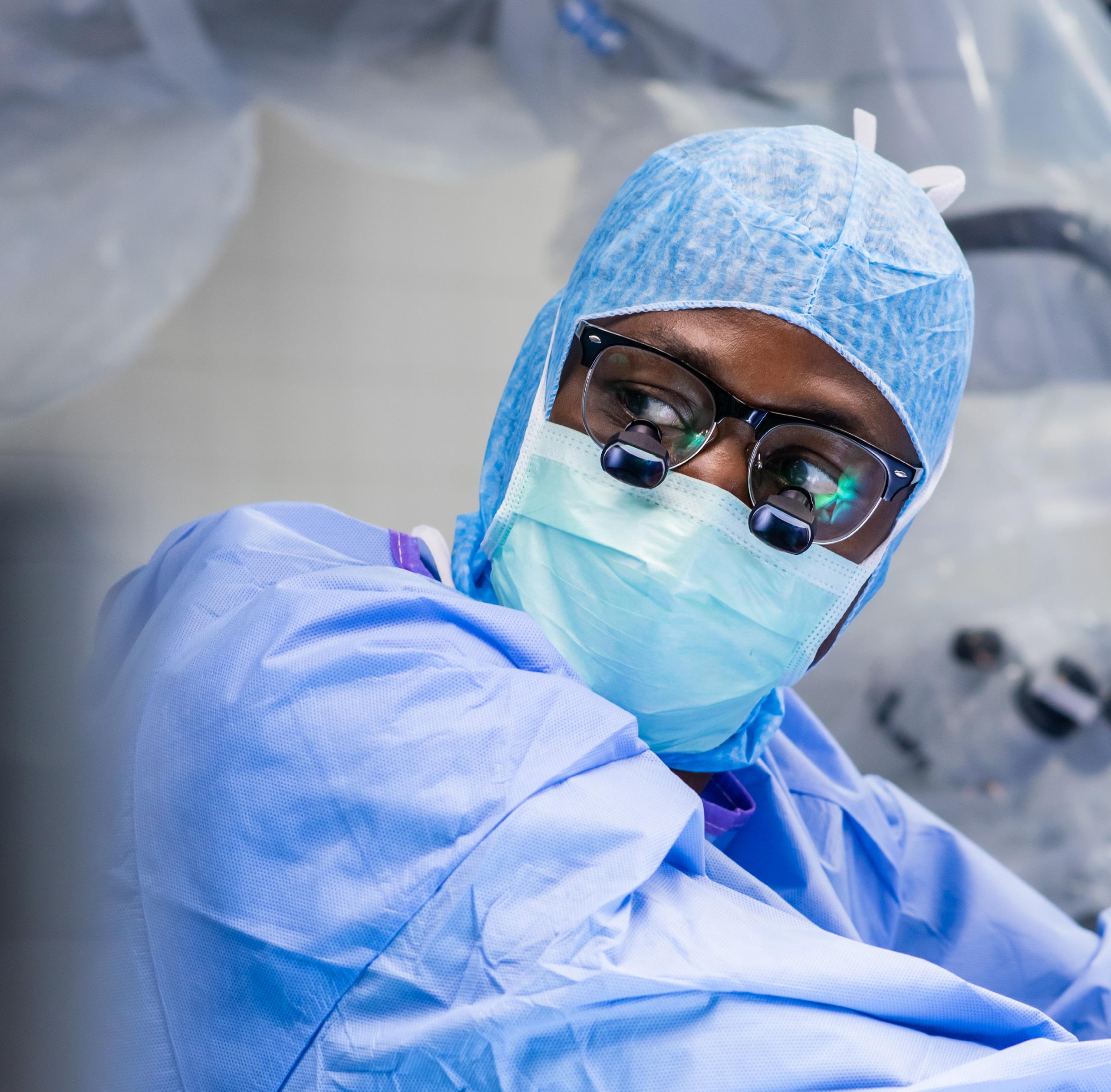

A CASE FOR SUPPORT
UC Neurosurgery Back, Neck and Spine Program
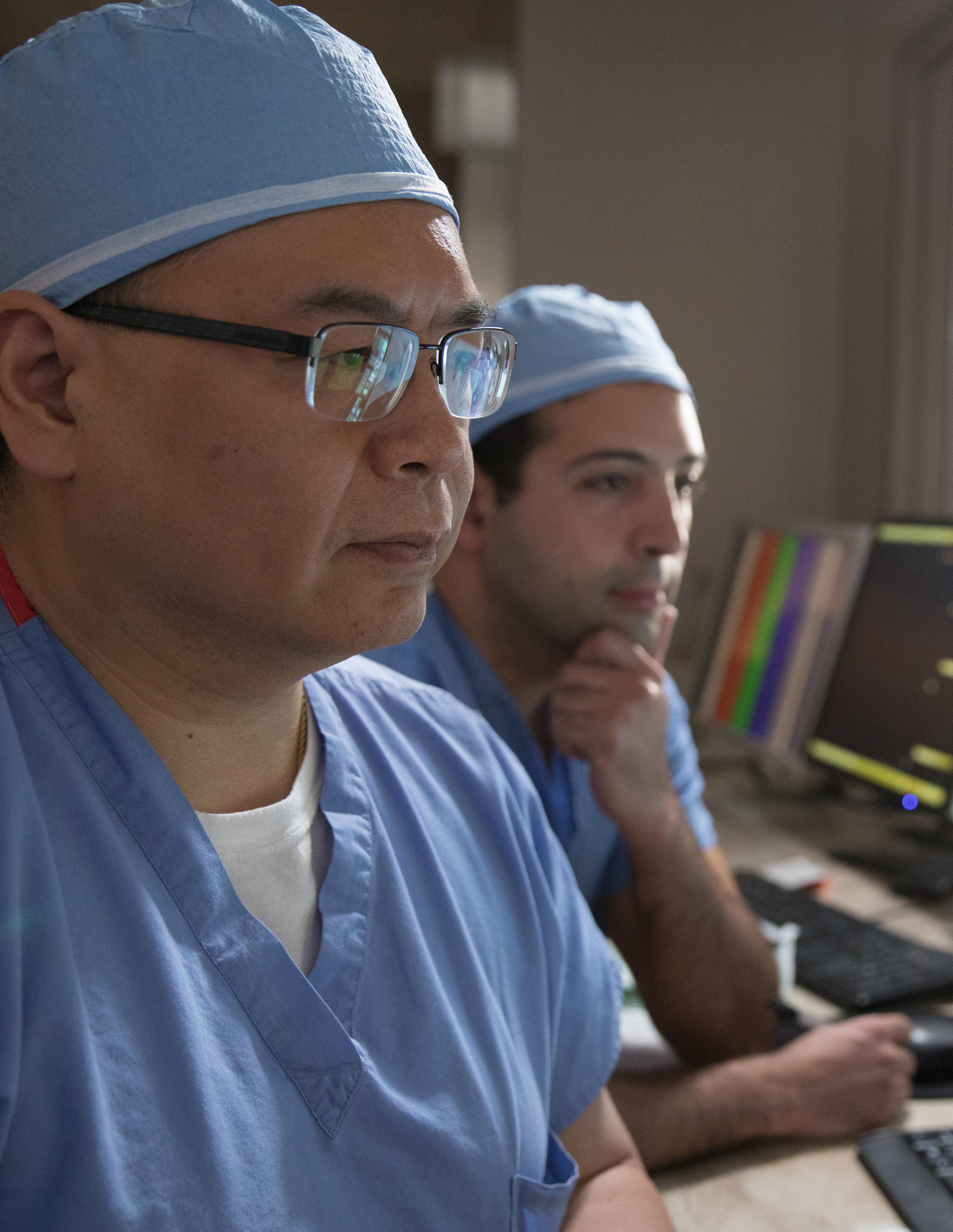
“Our neurosurgery team not only provides exquisite care for complex problems, with many of our referrals coming from other surgeons, we are also pioneering newer, less invasive techniques that speed recovery time and quality of care after surgery. With an eye on our educational mission, we research new techniques and teach cutting-edge options to improve the results of patient care for our future generations.”
JOSEPH
CHENG, MD, MS
Associate Director for UC Gardner Neuroscience Institute
Frank H. Mayfield Endowed Chair & Professor of Neurosurgery
On the cover: Owoicho Adogwa, MD, MPH, Associate Professor
Dear friend,
As one of the first surgical training programs in the country, at the University of Cincinnati Gardner Neuroscience Institute we are pioneering new approaches to improve care for brain, spine and nerve disorders. We deliver advanced specialty care with a multidisciplinary approach for the most complex cases—both emergent and elective. Our innovative research explores new treatments, approaches to pain management and minimally invasive techniques.
Our strengths:
• UC Health is home to Cincinnati’s most experienced team of neurosurgeons, advancing neurosurgical care since 1937. Our faculty clinicians are leading surgical experts on the brain, skull base, spine and nervous system.
• With more than a dozen subspecialty-trained neurosurgeons and some of the most skilled neurological nurses in the region, patients travel from nearly 40 states as well as other countries to seek the best care here in Cincinnati.
• A UC team is conducting the first gene study of its kind to identify the best post-operative pain management medication.
• We are pioneering minimally invasive awake surgery, to reduce risks and side effects that come with general anesthesia, such as long-term cognitive issues.
As part of the region’s only academic medical center and Level I Trauma Center, we are uniquely positioned to change the course of care for brain and spine.
We are so grateful for your thoughtful consideration to partner with our team in support of this important work that we are confident will improve lives here in Greater Cincinnati and around the world.
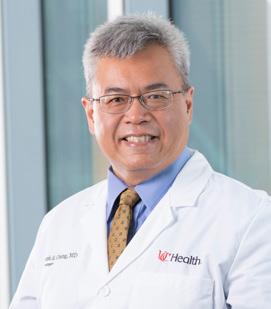
Joseph Cheng, MD, MS
Associate
Director
for UC Gardner Neuroscience Institute
Frank H. Mayfield Endowed Chair & Professor of Neurosurgery
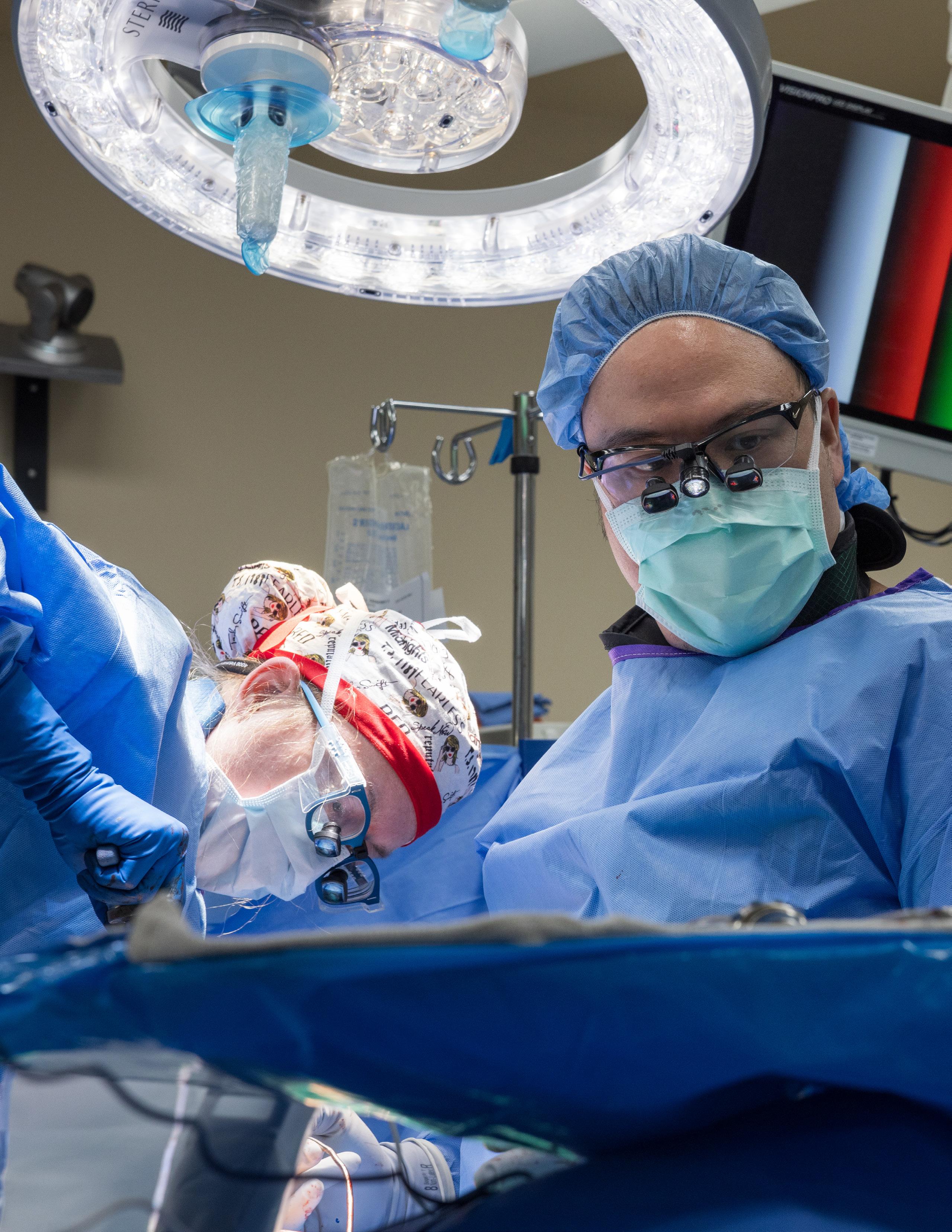
Justin Virojanapa, DO, Assistant Professor
RESEARCH
Growing and retaining top talent
At the UC Gardner Neuroscience Institute, our faculty leaders bring an evidence-based focus to everything we do. To attract rising-star researchers and expand our quests for discovery, we must evolve our resources to maintain the fast pace required for continual health care innovation.
Endowed chairs for clinical leadership and research faculty
Historically, endowed chairs were a want-to-have luxury, today they are a need-to-have tool in order for UC to be competitive with other nationally ranked academic medical centers. Chairs are essential to our ability to recruit and retain top talent among a competitive field of other neuroscience institutes. Establishing new chairs builds permanency and sustainability in our areas of excellence:
• Clinical leadership to advance the subspecialty care areas of neurosurgery back, neck and spine care to treat various complex conditions such as cranial cervical diseases and spinal tumors.
• Neurosurgery research chairs to expand clinical trials and basic neuroscience research, to enable the discovery of new medications and treatments, and protect time for physician-scientists to balance patient care with research and teaching. An endowed research chair allows us to recruit new thought leaders or retain vital faculty and ensures continuity of important research efforts at the university.
Paired with our advanced facilities and research operations, endowed chairs will attract nationally and globally recognized faculty to the UC Gardner Neuroscience Institute. This accelerates the research and development of new treatments, all to directly benefit more patients.
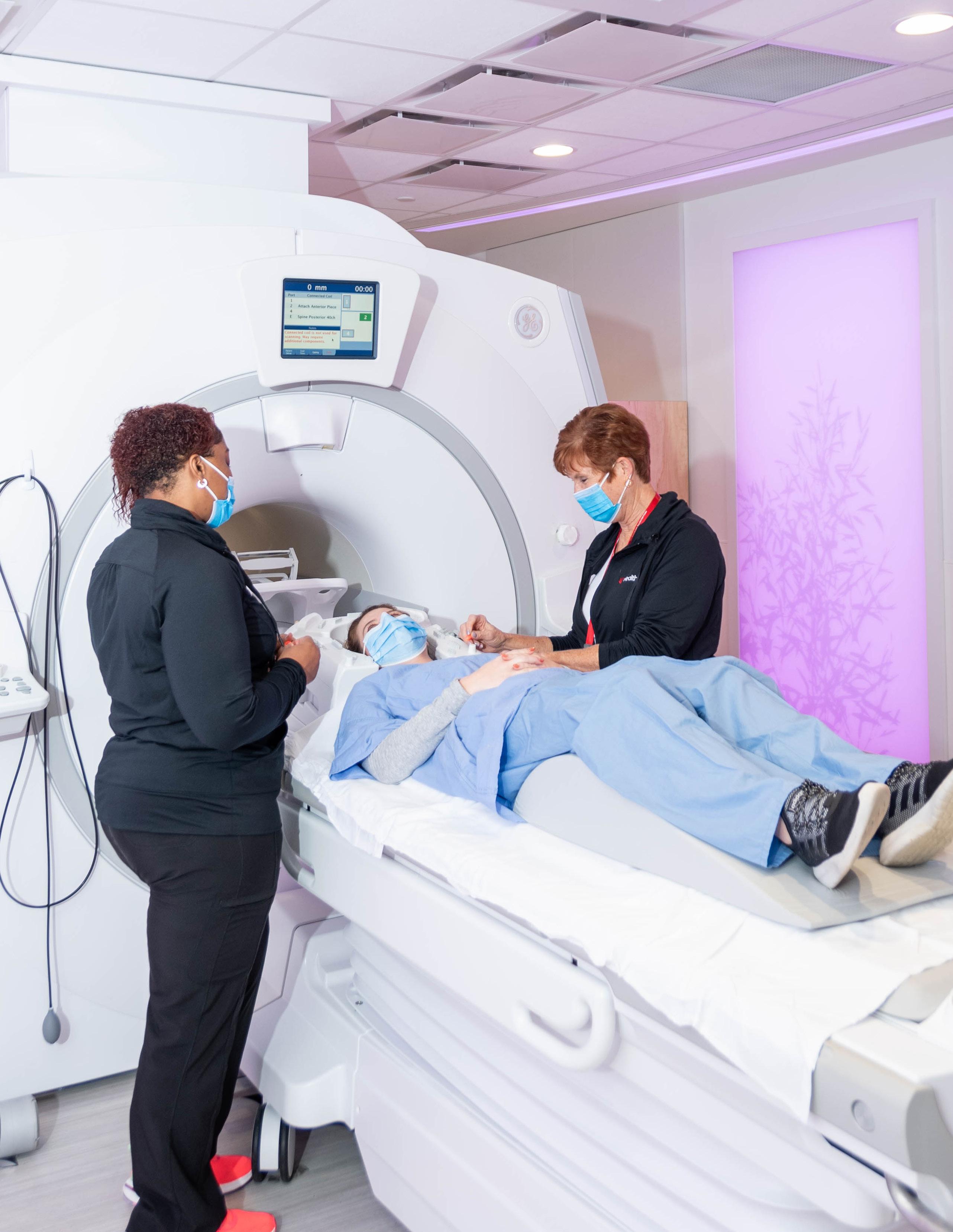
Expanding research for improved outcomes
MRI research technology
MRI scans are now a key component of clinical research trials at the neuroscience institute. Neuroimaging research allows a physician or researcher to evaluate a patient’s baseline or see how they respond to new medications or therapies. To support our robust research efforts, the institute is in need of a dedicated research scanner.
An MRI focused entirely on research, with staff trained in neuroinformatics and the latest imaging techniques, will broaden our discovery efforts across all specialty areas. The outpatient facility (that opened in 2019) was built to accommodate an additional MRI with researcher staffing space.
For example, the Cincinnati Cohort Biomarker Project, led by Alberto Espay, MD, involves a comprehensive collection of health data. It requires many MRI scans per year for its more than 800 study participants. With the evolution of personalized medicine our team now takes multiple images throughout a patient’s care journey to evaluate in real time how they are responding to medicine or therapies.
Research endowment fund
Neuroscience is the most prolific research area throughout the academic health center and the entire university. Creating a substantial research endowment will encourage further cross-disciplinary projects across departments and centers and can spark “high-risk/highreward” ideas that are less likely to find support through conventional grant funding.
Pilot grants are the mustard seeds of research. Their results lead to much larger grants from the National Institutes of Health and other external foundations.
For example, $925,000 in pilot grant funding from 2014 to 2020 resulted in $16,236,369 in monies from the government and external foundations—a 17 to 1 return on investment.
A research endowment fund is critical to progress and will allow investigators to pursue more novel, long-term and untested research projects, giving them the security to take the risks that will yield breakthrough discoveries right here in Cincinnati.


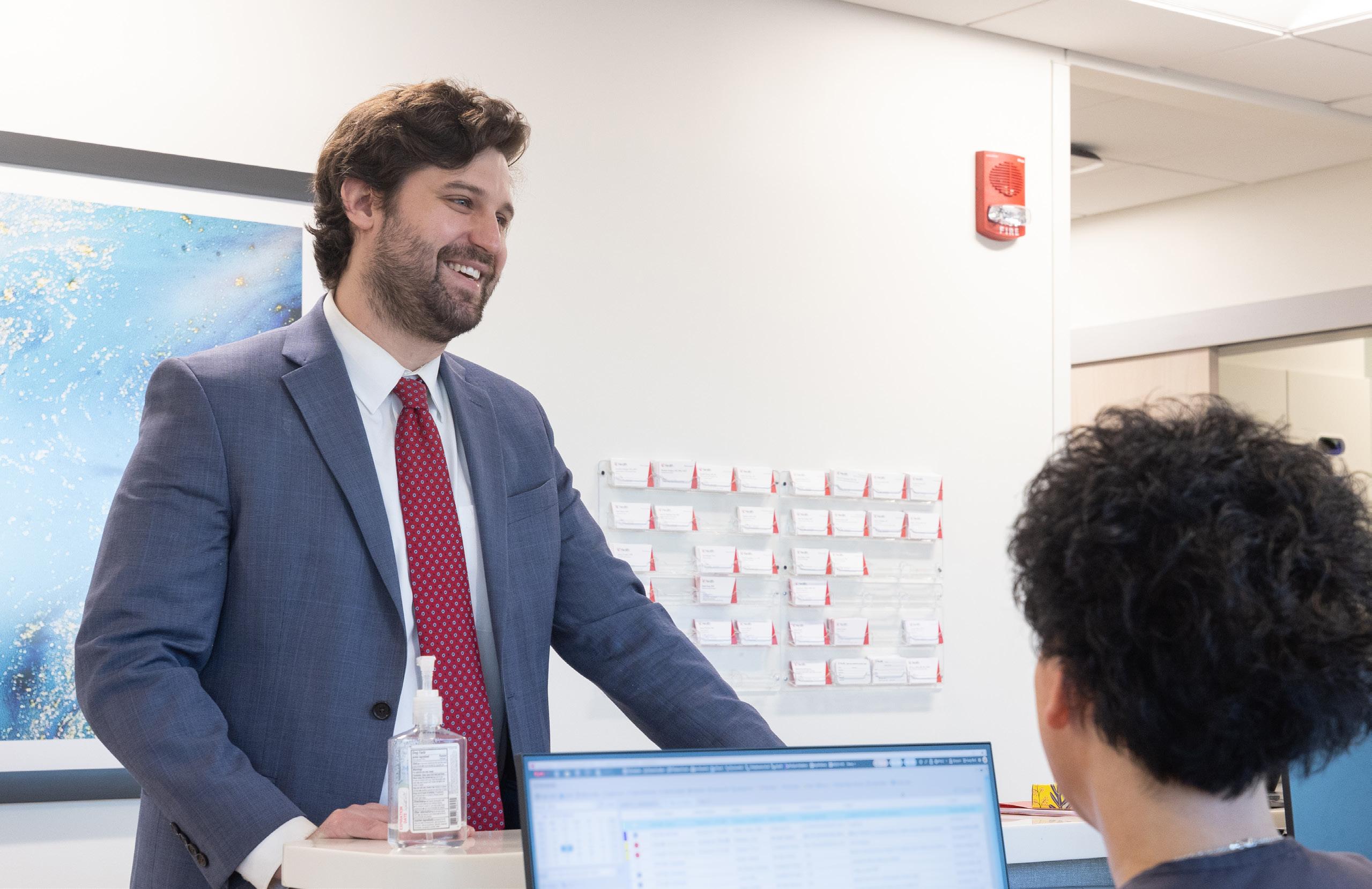
Benjamin Motley, MD, Assistant Professor
What is clinical research?
It is the study of medicines, devices, products or treatments to determine safety and effectiveness for potential human use. Clinical research may be used for prevention, diagnosis and treatment, or for relieving symptoms of a disease.
Benefits of clinical trials
For patients
• Access to a novel treatment that isn’t yet available and could improve the patient’s quality of life.
• Regular and attentive care while contributing to research that may save lives in the future.
For physicians and scientists
• Driving exciting advances in patient care, discovering new treatments.
• Improving the standard of care and patient quality of life.
Research focused on precision medicine
At the UC Gardner Neuroscience Institute, we are exploring innovative new approaches to improve patient outcomes and enhance quality of life. Our research seeks to understand the individual patient through a precision medicine lens.
Personalized pain management
Personalized medicine has the potential to revolutionize pain management and surgical outcomes, reducing the risk of addiction and opioid dependence while enhancing patient recovery. Early data from a UC pilot study revealed three out of four patients were prescribed a pain medication that their body was not able to effectively process. The care team was able to intervene and prescribe the right medicine based upon an individual's unique biology.
By simply taking a cheek swab from a patient before surgery, we can gather critical data to determine the most effective pain medication tailored to a patient’s unique biology and metabolism.
This personalized approach allows the care team to develop a unique pain management plan for each patient. Benefits include shorter hospital stays, more effective pain relief, quicker engagement in physical therapy and a faster return to normal activities. Our long-term goal is to expand this initiative across the entire health system to improve pain management and medication administration comprehensively.
We are one of only two academic medical centers nationwide exploring this personalized approach as a solution.
“Getting to the truth of a patient’s problem and how best to cure it, requires data scientists, analysts and biostatisticians—people and tools that aren’t normally part of the healthcare model. And I think this is where philanthropy and the generosity of our community and patients can make a big impact.”
JOSEPH CHENG, MD, MS Associate Director for UC Gardner Neuroscience Institute
Frank H. Mayfield Endowed Chair, Professor of Neurosurgery
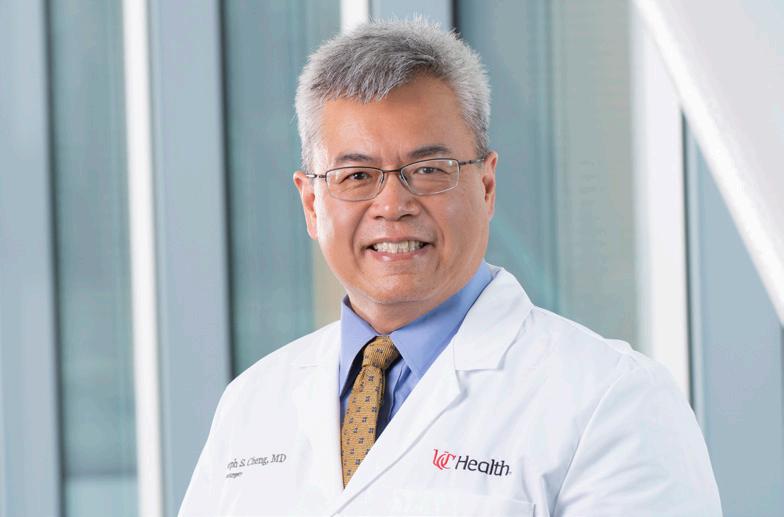
Awake spinal surgeries to improve recovery
Only a few centers across the country are beginning to offer “awake” spinal surgery. This novel, minimally-invasive technique uses spinal anesthesia instead of general anesthesia, providing more options to patients who require surgery for degenerative spinal disorders.
With this new surgical option, we are embarking on clinical research to understand how a patient’s exposure to anesthesia may put them at risk for future cognitive impairment. Previous studies have shown that patients 65 and older may experience cognitive decline following surgical general anesthesia.
Working with data from a large 20-year study that followed patients, this project is focused on both prevention and intervention. We can leverage our access to data that already exists and current patient questionnaires to analyze this information and help guide us to determine which patients are the best candidates.
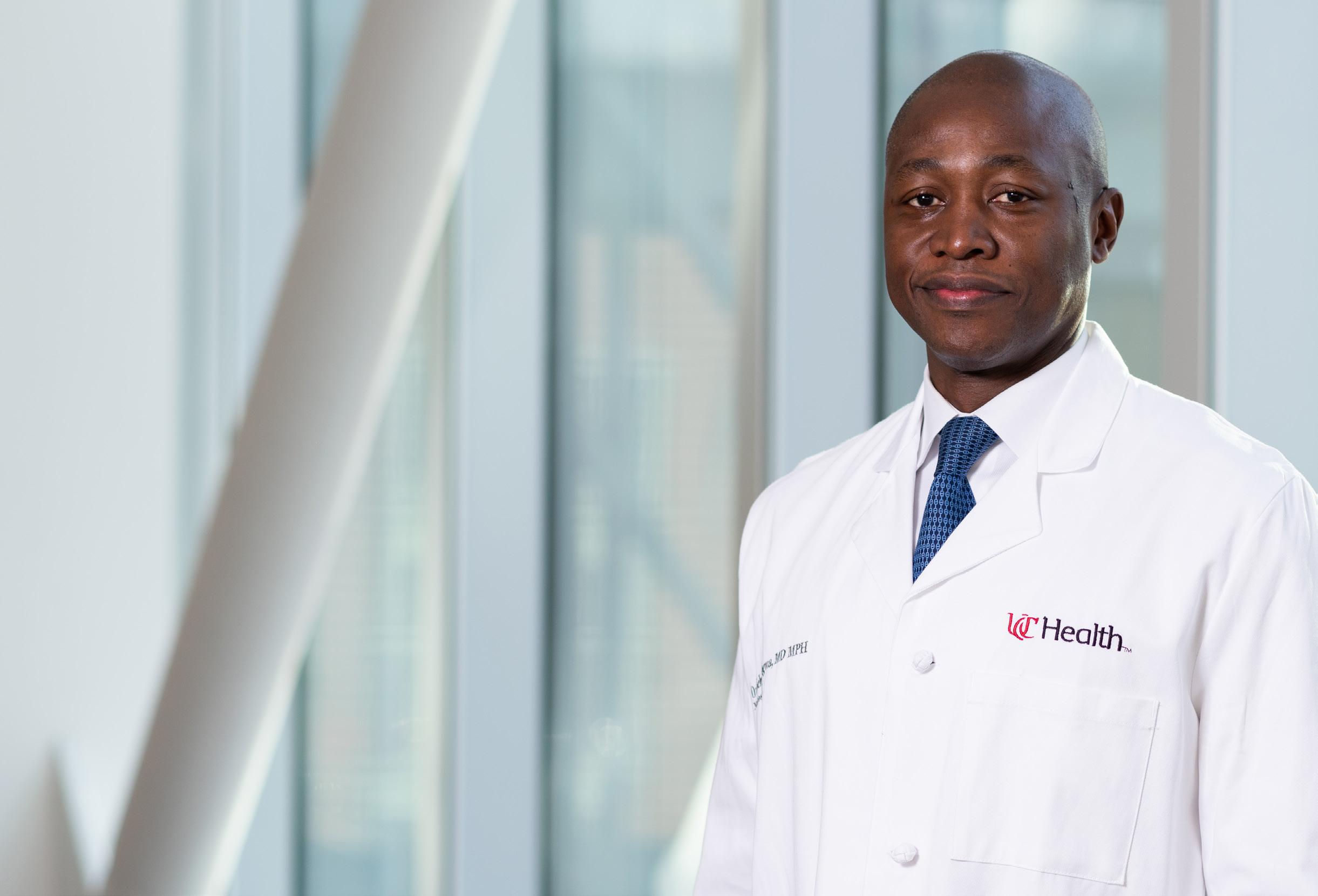
“The implementation of an awake spinal surgery protocol, complemented by genotype-guided opioid therapy post-surgery, is a pivotal component of our holistic approach aimed at providing tailored, patient-centric spinal health care. With the collaborative efforts of our multidisciplinary team, we are dedicated to enhancing the wellbeing and quality of life of individuals afflicted with back pain and spinal pathologies.”
OWOICHO ADOGWA, MD, MPH Associate Professor
Goodyear Microsurgery Training Lab
The Goodyear Microsurgery Training Lab provides key training to our neurosurgery residents at the University of Cincinnati. Established in 1986, the laboratory has an international reputation and attracts research and clinical fellows from across the globe. Expert skills honed in the lab serve as an integral component of the curricula for neurosurgery residents at UC.
The lab provides a setting for neurosurgeons to learn and study surgical anatomy, particularly of the skull base, and become skilled in microsurgical and endoscopic procedures, as well as pioneer new surgical techniques.
Work produced at the Goodyear Lab continues to be recognized as seminal, and neuroanatomical descriptions as well as surgical techniques developed or perfected in the lab are currently in use in operating rooms around the world. Philanthropy will allow our team to enhance the facilities and ongoing training needs.
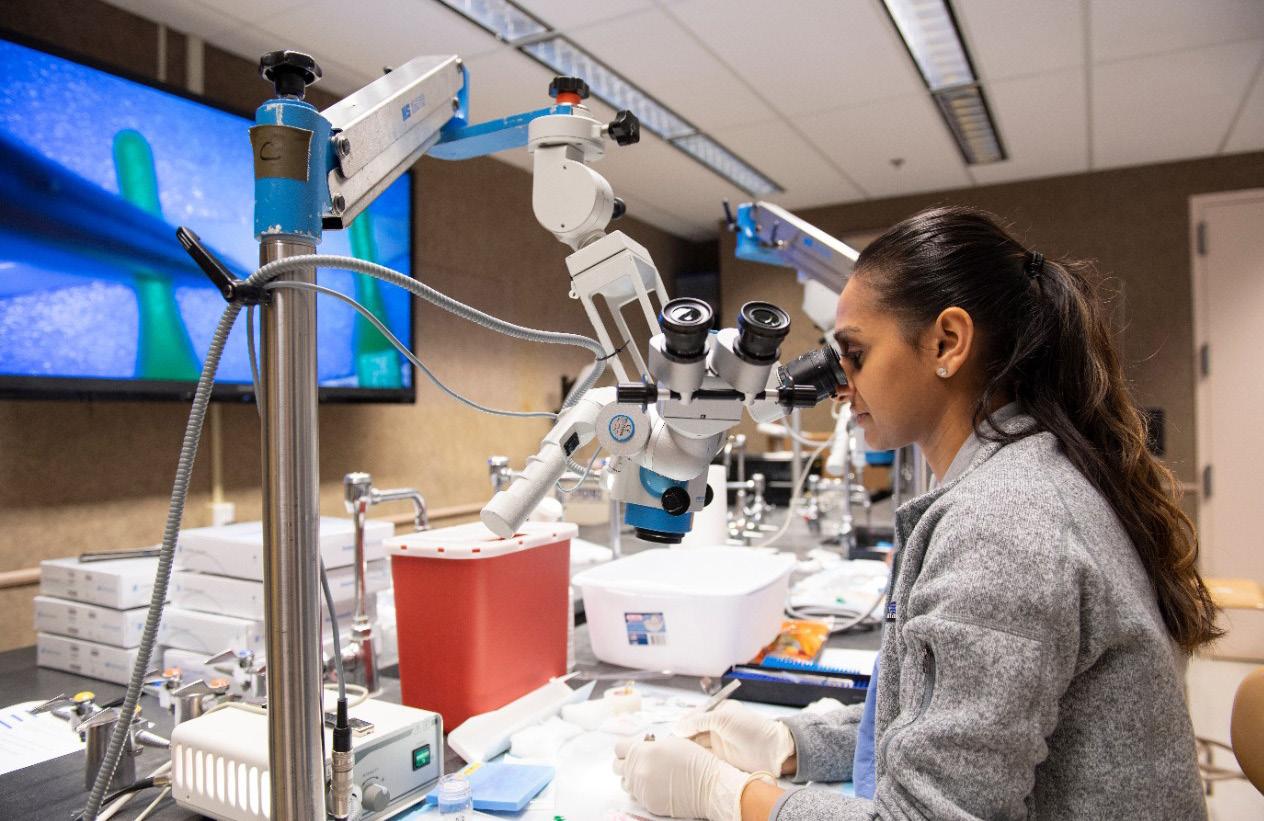
CLINICAL CARE
Grow our patient data infrastructure, strengthen services for our centers of excellence, creating a national destination for care
The power of big data: Improving patient otcomes
To offer truly world-class care for our patients, we need to rely on not just the expertise of one doctor, but leverage the expertise of every single doctor in our institute and beyond. We must continue to scale our approaches to personalized treatment for our patients, understanding that care is unique to each individual.
With the vast amount of health data now available, a physician has millions of data points at their fingertips. The flow of new information never stops as biomedical knowledge from new research doubles every 73 days. However, the time lag from putting new knowledge intopractice currently takes more than a decade.
The UC Gardner Neuroscience Institute is building an integrated network of research, clinical data and quality improvement processes that will rapidly deliver new learnings to the bedside, vastly improving patient care and quality and longevity of life.
This network will connect all of our centers of excellence, and eventually connect us to peer neuroscience institutes like the top-ranked Weill Institute at UC San Francisco. These connectors multiply the expertise of our institute, identifying new approaches and treatments that will improve patient outcomes not only in our region, but worldwide.
Adopting a big data approach to care
Before
• Average 17 years from evidence to practice.
• Lacks patient input and learned experience.
• Disparities in practice, decision-making.
• Measures process with outcomes.
After
• Less than 3 years to apply new evidence to patient care.
• Patient-driven research and resources.
• Aligned use of best practices, efficient and accessible evidence.
• Measures real-time patient outcomes, to continuously modify care.
Leveraging big data
This approach to care will measure real-world outcomes from our patients and make immediate and continuous improvements to the system as a result. Our leaders have already demonstrated how an integrated, data-driven approach can optimize patient outcomes for epilepsy and mental health care.
For example, in the neuroscience intensive care unit (NS-ICU), families can quickly feel overwhelmed at the number of clinicians and staff coming in and out of a hospital room at all hours. Gathering insights from a patient advisory group, Laura Ngwenya, MD, PhD, director of neurotrauma, worked with her team to develop a patient guide that explains the various roles of an ICU team, as well as what types of questions they can help answer. Patient families now receive this handout as a guide to their care team, while the Neurotrauma Center tracks how families receive it, use it and gauge if it helps improve the patient and family experience in the NS-ICU.
Enhanced clinical services
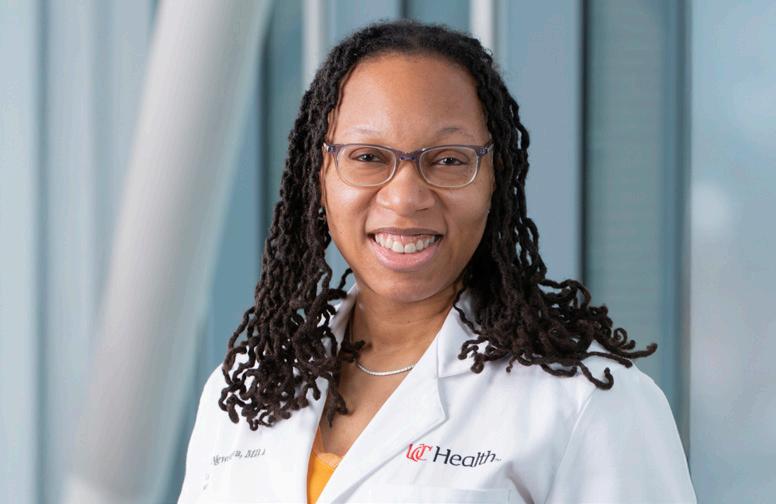
Expanding talented, highly trained staff is crucial to provide the most comprehensive care to our patients and their caregivers. In addition to our physician leaders, these key roles include:
• Nurse navigators who provide an essential core of clinical expertise for our center.
• Social workers who provide critical care and guidance to community and other resources for our patients, particularly those managing complex conditions.
• Imaging technicians who are skilled in the latest diagnostic imaging procedures.
As our patient outcomes continue to excel, new technology and comprehensive services in support of the whole person will evolve across the institute.
Our current priorities include:
• Endoscopic spine surgery equipment: New surgery techniques can offer our patients the least invasive surgical options. Benefits include a shorter recovery time, potential for less pain medication and a quicker return to normal activities.
• Software to improve the patient journey, upgrading our ability to seamlessly communicate with patients.

EDUCATION
Building excellence in care, specialty training and research
In the hospital setting, talented nurses, resident physicians and support staff often spend more time with patients and families than the attending physicians. These expert care teams provide compassionate, research-driven care to the bedside—and are a key component to becoming the neuroscience institute by which all others are measured.
Nursing endowment and expansion of programs
The demand for neuroscience nurses is high, due in part to an aging patient population and a growing rate of neurologic conditions, paired with a national nursing shortage. This high demand is also due to the extensive and ongoing requirements for continual, progressive education and skills training that nurses need to provide care in the neurological specialty and stay abreast of evolving advances and technologies.
An endowment fund will build opportunities for nurses to train, advance and contribute to the science of neurological care, further positioning our institute as a national leader in treating complex neurological problems.
Investments in nursing education within UC and area schools will grow the pipeline of passionate, skilled nurses, as well as help talent retention. Additional investments will enhance our ability to support nurses with patient mobility and ambulation, technology improvements and continuing education.
Fellowship positions
One and two-year post-graduate training programs provide the opportunity to advance in a subspecialty area of neurological care. Fellowship positions will include MDs but also extend to opportunities for physician assistants and nurse practitioners who wish to pursue specialized training. Fellows will work in outpatient, inpatient and ICU settings across all subspecialty areas of clinical neurology and neurosurgery.
Unlike residency programs, funding for fellowships is not typically covered by federal programs like Medicare. We rely on philanthropy and other efforts to provide the funding to train the next generation of subspecialists.
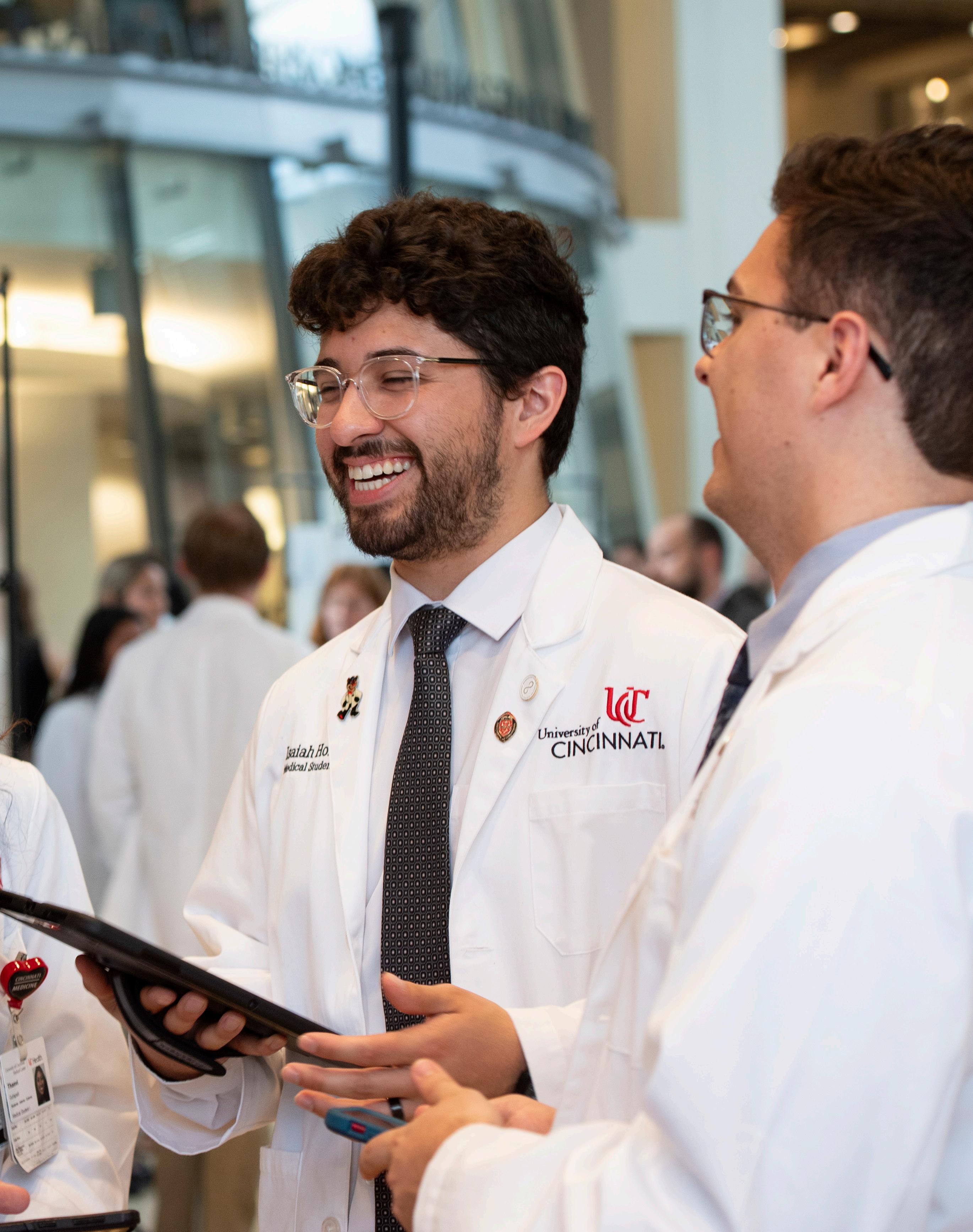
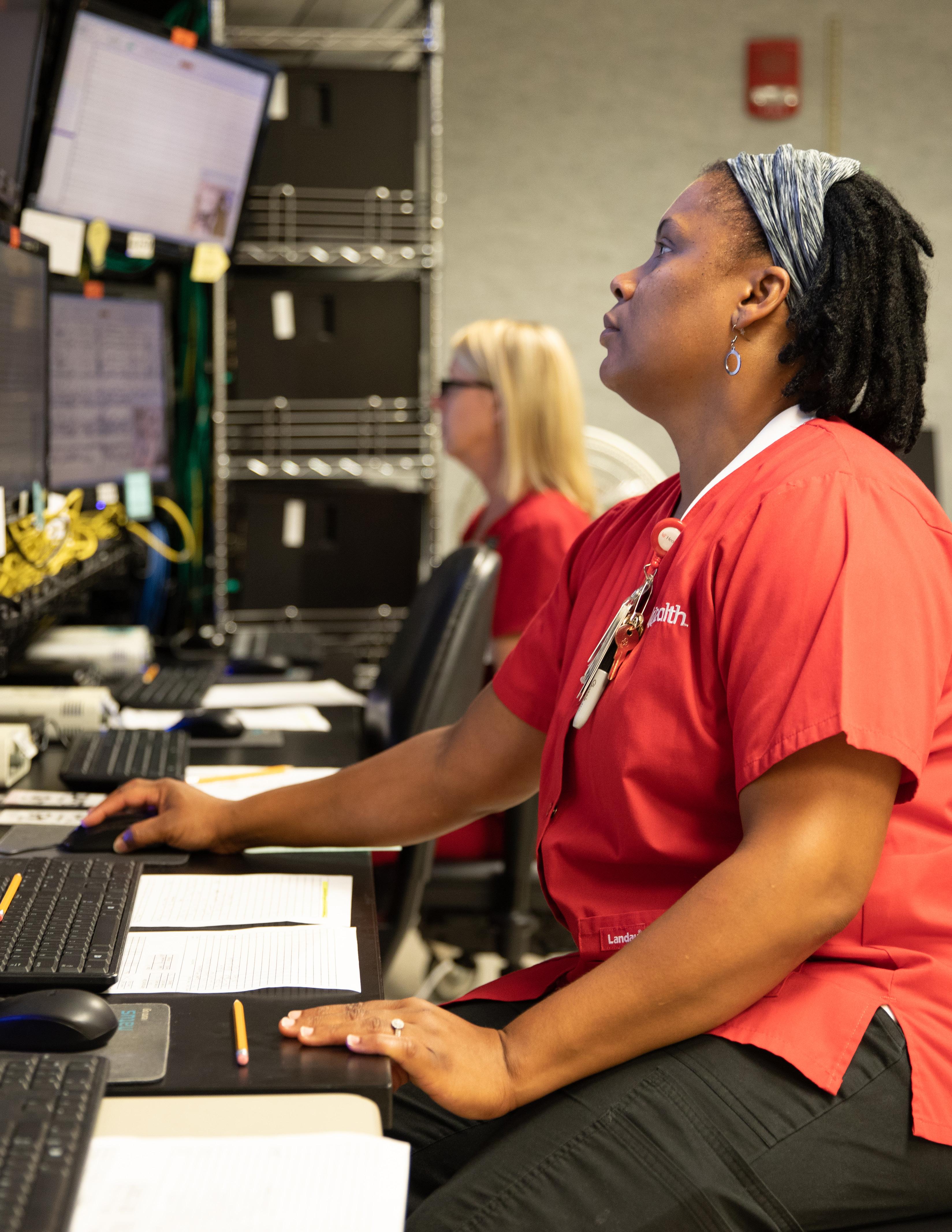
Education and training programs
The UC Gardner Neuroscience Institute is a magnet of talent, attracting out-of-state high school graduates and potential graduate students to Ohio with the promise of a world-class education, mentors in research and industry, and access to leading laboratory and clinical facilities. We plan expansion and support of the following areas:
• Simulation lab space and training support
Several of the top programs in the country use simulation-based training: realistic clinical environments that blend learning with virtual and hands-on experiences through a model of team-based patient care. At UC, leadership from across the academic health center and UC Health have articulated a high-level vision and operational model for a simulation center that will teach not only basic procedures but also complex neurological care skills.
• Student recruitment and programming
The UC College of Medicine is committed to building a physician workforce that accurately reflects the community we treat. Our mission is to recruit and retain the most talented students, residents and faculty to our academic medical center and support them in pursuing neuroscience specialties.
• Continuing medical education
Training programs will provide continuing medical education in our areas of excellence. New programming will offer primary care physicians opportunities to enhance learning in often requested specialties like depression and anxiety.
MEASURES
OF SUCCESS
Philanthropic support will speed our time to impact in the areas of research, patient care and training the next generation. We will track and measure our success in these areas through improved scores and metrics in:
Research
Our research portfolio will grow and be measured by: the number of publications in top level journals, faculty presentations at conferences, and scores/rankings from the National Institutes of Health and Blue Ridge Rankings. Additionally, we will track membership growth in premier research networks such as StrokeNET, Mood Disorders and the Alzheimer’s Disease Research Centers (ADRCs).
Clinical
Investments into personalized medicine and clinical advancements will be measured by: improving patient outcomes (relevant to a patient’s quality of life including symptoms, functionality, and physical, mental and social health), impacting key hospital metrics like decreasing mortality and re-admissions rates, and improving patient safety and satisfaction. These will additionally support our reputation rankings in mass media outlets like U.S. News and World Report.
Education
Being a destination for complex neurological care also means being a destination for the best and brightest talent—from students pursuing our residency and specialty fellowship programs to new clinicians and researchers. As demand increases for limited spots (for example, hundreds of fellowship applicants for 10 openings), so will competitiveness and the strength of applicants, along with the quality of care and research across the institute. Professional physician networks like Doximity and professional organizations like Association of American Medical Colleges will help us measure this.
THANK YOU
We’re grateful for your thoughtful consideration of a leadership gift to back, neck and spine care in support of our 10-year Vision for Neuroscience.
CONTACT
Emma Laverty
Associate Vice President for Development University of Cincinnati Foundation
Emma.Laverty@foundation.uc.edu
610-331-9046

To learn more about how philanthropy can make a meaningful impact, scan the QR code or visit foundation.uc.edu/ucgni/spine
